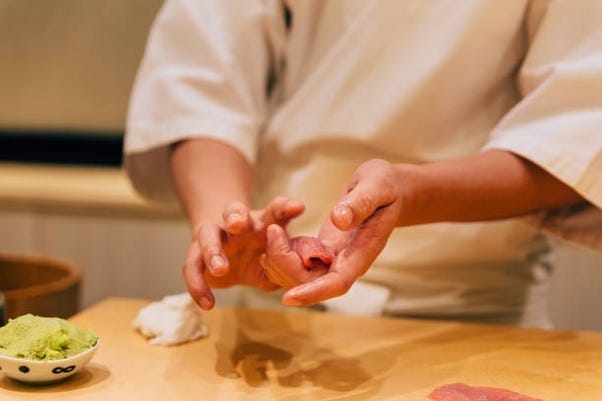There’s a cultural fascination with the concept of Ikigai and its association with work, but there may be misconceptions about how Japanese people perceive their careers in relation to Ikigai.
This article will explore the Japanese perspective on work and Ikigai, shedding light on cultural nuances and providing insights into how the two intersect.
We’ll look at the cultural significance of work in Japan, differences in attitudes toward work between Eastern and Western cultures, and the concept of Ikigai within Japanese society.
1. The concept of craftsmanship

In many cases, Japanese work culture is often described as having a craftsman-like quality, known as “shokunin-waza.” It is considered top-notch globally, from meticulous craftsmanship to customer service in hotels and supermarkets.
Behind this lies the distinct Japanese trait of unwavering dedication and earnestness in a diligent approach to work.
Japanese people are known for preserving ancient traditions and relentlessly honing their skills to elevate their craftsmanship. They place heavy importance on repetition in work, especially in craftsmanship.
Sushi chefs, for example, are known for their particularly lengthy apprenticeships. Similarly, employees repeatedly perform unfamiliar tasks in a company setting to refine their skills. It’s rare for newcomers to be immediately entrusted with significant tasks.
In Japan, the ultimate goal is to improve and learn through repetition.
Some believe that the craftsman-like quality stems from a passion for creativity. Still, in Japan, the attitude of diligent problem-solving day by day is valued more than spontaneous inspiration.
2. The uniqueness of the Japanese view of work
Let’s introduce some statistical surveys reflecting the differences in this aspect of Japanese work culture compared to other countries worldwide.
According to Randstad’s Work Monitor survey, which spanned 20 years and surveyed 35,000 workers aged 18 to 67 across 34 markets,
only 48% of Japanese respondents considered work important in their lives, compared to 72% globally.
Similarly,
while 57% of people worldwide feel that their work gives them a sense of fulfillment, only 38% of Japanese respondents reported feeling the same.
The alignment of employer and personal values and goals significantly influences the perception of work importance and fulfillment.
Globally, 73% of respondents feel this alignment, while in Japan, it’s only 51%.
Interestingly,
the proportion of people in Japan who refuse to work for companies whose values do not align with their own regarding social and environmental issues is lower at 36%, compared to the global average of 42%.
This suggests that relatively speaking, the importance of work in life and the proportion of work that is a source of fulfillment are lower in Japan, and a higher percentage of Japanese people do not seek alignment between company values and their own.
Additionally, the Work Monitor 2023 survey, which polled 35,000 individuals in 34 countries and regions across Europe, Asia-Pacific, and North and South America, revealed that
globally, over half of the respondents expressed a desire to retire by age 60. In contrast, in Japan, only 23.8% shared this sentiment.
Conversely,
the proportion of those who wished to remain active throughout their lives was 1.5% globally but 8% in Japan.
This indicates that Japanese individuals prioritize remaining active in the workforce while healthy, reflecting a strong work ethic and dedication to personal responsibility rather than pursuing early retirement.
3. Yarigai vs. Ikigai
Many view the unique way Japanese view work, not seeking fulfillment from it but desiring to continue it throughout their lives, is related to how Ikigai is intertwined with work in Japanese culture and its broader scope beyond professional pursuits.
And, this can be explained in terms of the distinction between “yarigai” (sense of fulfillment from work) and “ikigai” (sense of purpose).
Generally, “yarigai” refers to the sense of competition or enjoyment in something, often used in relation to tasks or activities, signifying elements that lead to motivation or enjoyment, such as the satisfaction or sense of accomplishment upon completing an action or achieving results, and the sense of duty that one should do it.
On the other hand, “ikigai” is understood as things that bring joy and purpose to life, enabling one to enjoy life or persevere for their sake even in hardship. “Ikigai” varies from person to person, ranging from small things like a delicious meal to grand aspirations like the prosperity of one’s homeland, although they share the impact of maintaining motivation for life. It involves feeling a broader sense of significance beyond the fulfillment derived from work.
When seeking “yarigai” at work, evaluation and salary increases from others become essential.
Meanwhile,
“ikigai” involves seeking meaning across a broader spectrum than just the fulfillment derived from work, which often blurs boundaries between personal life and the workplace.
However, when Ikigai is poorly sought after in the workplace, it can lead to problems.
This is also why the Japanese workplace is known to have unique issues, such as workplace harassment and excessive overtime (referred to as “zangyo”), contributing to cases of death from overwork (known as “karoshi”).
We will go further into strategies for achieving “Ikigai” at work in a separate article.
If you want to receive notifications whenever I publish a new piece, you can follow me on Medium. Until next time!